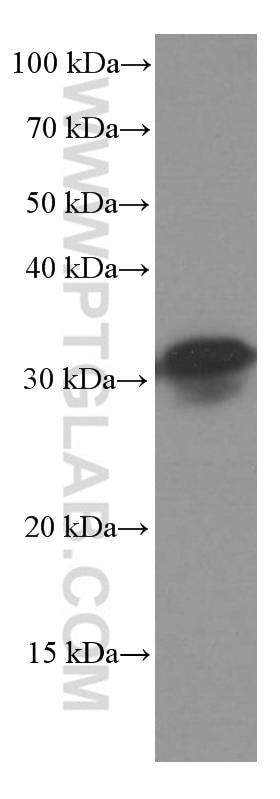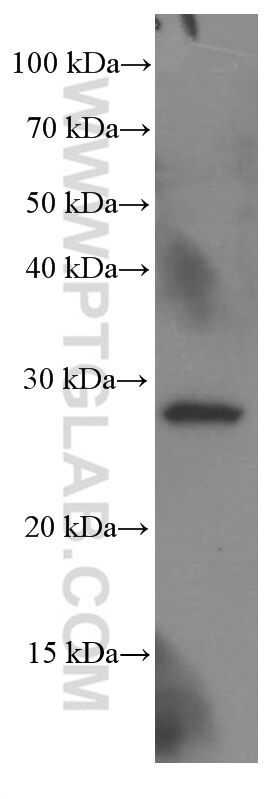Anticorps Monoclonal anti-SCP3
SCP3 Monoclonal Antibody for WB, ELISA
Hôte / Isotype
Mouse / IgG1
Réactivité testée
Humain et plus (1)
Applications
WB, ELISA
Conjugaison
Non conjugué
CloneNo.
1A11F1
N° de cat : 66409-1-Ig
Synonymes
Galerie de données de validation
Applications testées
| Résultats positifs en WB | tissu testiculaire humain, cellules DU 145 |
Dilution recommandée
| Application | Dilution |
|---|---|
| Western Blot (WB) | WB : 1:1000-1:8000 |
| It is recommended that this reagent should be titrated in each testing system to obtain optimal results. | |
| Sample-dependent, check data in validation data gallery | |
Applications publiées
| WB | See 1 publications below |
| IF | See 2 publications below |
Informations sur le produit
66409-1-Ig cible SCP3 dans les applications de WB, ELISA et montre une réactivité avec des échantillons Humain
| Réactivité | Humain |
| Réactivité citée | souris |
| Hôte / Isotype | Mouse / IgG1 |
| Clonalité | Monoclonal |
| Type | Anticorps |
| Immunogène | SCP3 Protéine recombinante Ag19330 |
| Nom complet | synaptonemal complex protein 3 |
| Masse moléculaire calculée | 236 aa, 28 kDa |
| Poids moléculaire observé | 30 kDa |
| Numéro d’acquisition GenBank | BC062662 |
| Symbole du gène | SYCP3 |
| Identification du gène (NCBI) | 50511 |
| Conjugaison | Non conjugué |
| Forme | Liquide |
| Méthode de purification | Purification par protéine G |
| Tampon de stockage | PBS with 0.02% sodium azide and 50% glycerol |
| Conditions de stockage | Stocker à -20°C. Stable pendant un an après l'expédition. L'aliquotage n'est pas nécessaire pour le stockage à -20oC Les 20ul contiennent 0,1% de BSA. |
Informations générales
SYCP3 is an essential structural component of the synaptonemal complex. This complex is involved in synapsis, recombination and segregation of meiotic chromosomes. SYCP3 is required for centromere pairing during meiosis in male germ cells. SYCP3 is also required for normal meiosis during spermatogenesis and male fertility. Mutations in SYCP3 are associated with azoospermia in males and susceptibility to pregnancy loss in females.
Protocole
| Product Specific Protocols | |
|---|---|
| WB protocol for SCP3 antibody 66409-1-Ig | Download protocol |
| Standard Protocols | |
|---|---|
| Click here to view our Standard Protocols |



